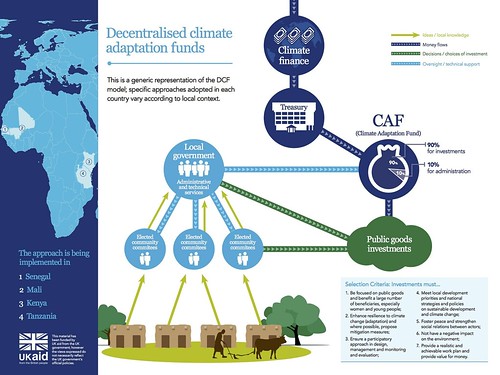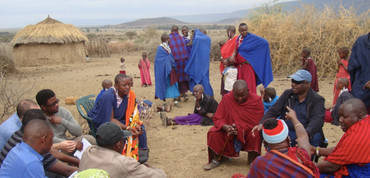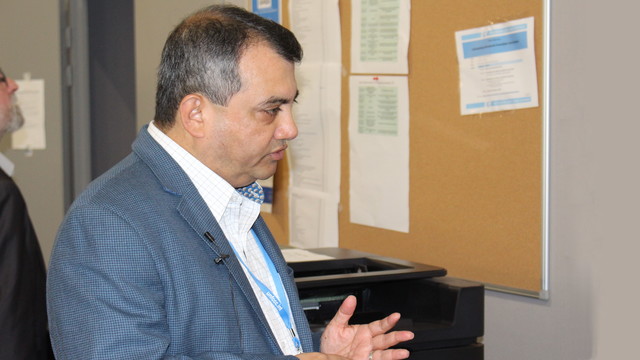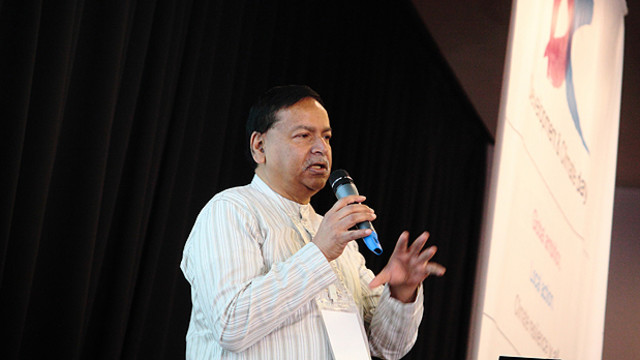How devolved climate finance can deliver climate resilience at local level
IIED and partners showcase the potential of decentralised climate finance to support community resilience to climate change.
This animation explains how decentralised climate funds operate.
IIED and partners are highlighting the potential of devolved climate finance to deliver climate funding that is equitable and responsive to the needs of local people.
Governments in Mali, Senegal, Tanzania and Kenya are currently piloting decentralised climate finance approaches. They aim to demonstrate that local climate adaptation planning and budgeting can build resilience to the impacts of climate change and reduce poverty, particularly for people in typically poor and marginalised areas.
The organisations have released an animation that explains how decentralised climate funds operate, and the benefits they offer. The four-minute video is available on IIED's YouTube channel in English and in French. The videos are also available on the Near East Foundation's (NEF) Vimeo channel.
IIED and the International Federation of Red Cross and Red Crescent Societies (IFRC) are organising a side event about devolved climate finance at the 22nd Conference of the Parties (COP22) in Marrakech.
The event on 16 November 2016 will feature high-level speakers, including the chair of the African Group on Climate Change Negotiation and chair of the Least Developed Countries Group, Tosi Mpanu-Mpanu, as well as Lucy Ssendi of the President of Tanzania's Office for Regional and Local Government, and Fatoumata Nafo-Traore, regional director for Africa, the International Federation of the Red Cross Red Crescent Societies. It will be chaired by Pete Betts, director, International Climate Change at the Department for Business, Energy and Industrial Strategy.
Organisers say the event will showcase how devolved climate finance can achieve significant global benefits. The meeting will also provide an opportunity to discuss how the approach can be modified to suit country contexts, identify emerging achievements, and deliver a transformational approach to building resilience.
Decentralised climate finance mechanisms in Kenya, Mali and Senegal are providing practical examples of how devolved government structures can be used to channel climate finance to the local level effectively and efficiently. -- IIED
The side event is being screened by the UNFCCC on its YouTube channel.
Ensuring climate finance meets local needs
Developed countries have committed to ensuring more than US$100 billion of climate finance flows to developing countries each year by 2020. To date, much of the committed international funding for climate adaptation has been channelled directly to national governments and non-governmental organisations. Communities and local governments have often had little say in how the funds are spent.
Using the architecture of decentralisation can enable some countries to ensure that adaptation projects are relevant to community needs.
Local and national governments are being supported to pilot local adaptation funds in Kenya, Tanzania, Mali and Senegal. The projects are funded by UK aid.
Governments in these countries are establishing mechanisms that enable them to access climate finance and channel it to 'Climate Adaptation Funds' (CAFs) at local government level, where the money can be planned and budgeted in partnership with communities.
To ensure that local people benefit, 90 per cent of each fund is allocated to investment prioritised by communities and local authorities, and 10 per cent is used to manage the fund. This makes it very good value for money.
Local communities will decide how the money is allocated via an inclusive planning process that is embedded into local government systems. The process involves setting up adaptation planning committees at both community and local government level. The community-level committees are made up of individuals chosen by the community for their integrity and relevant knowledge. They consult on what would be the best investments in public goods and prioritise them in partnership with government.
In Kenya, the Adaptation Consortium (ADA) is providing technical assistance to the National Drought Management Authority of Kenya, as part of the Strengthening Adaptation and Resilience to Climate Change in Kenya Plus (StARCK+) programme.
In Tanzania, IIED and the United Nations Capital Development Fund (UNCDF) are providing technical support for a five-year Decentralised Climate Finance project, which is working across 15 pilot districts in mainland Tanzania and three districts in Zanzibar.
In Senegal and Mali, a consortium led by the Near East Foundation and including Innovations, Environment and Development-Africa (IED-Afrique) and IIED seeks to improve the climate resilience of up to 750,000 people. Working in four Départements in Senegal and three Cercles in Mali, the project will establish six devolved CAFs worth £500,000 (445 million CFA francs) each.
The CAFs will be managed in a transparent, accountable, and cost-effective manner and will invest in public good resilience projects that have been selected and prioritised during community consultations. The in-country implementation is being led by IED Afrique in Senegal and NEF in Mali. It forms part of the Building resilience and adaptation to climate extremes and disasters (BRACED) programme funded by UK aid.
A series of infographics were produced in November 2016 to illustrate the decentralised climate fund model. They can be viewed on IIED's Flickr site or in the slideshow below. Click on the arrows to scroll through the charts, or click on the images to enlarge them and view them using Flickr.
Find out more:
- How local governments in the drylands of Kenya, Mali, Senegal and Tanzania are establishing local-level climate adaptation funds
- Read about IIED's work on Decentralising Climate Funds in Mali and Senegal
- Watch the video on IIED's YouTube Channel
COP22 side event details:
Devolved climate finance: how to reach the most vulnerable
Date: Wednesday, 16 November, 2016
Publications
Decentralising climate finance to reach the most vulnerable, Ced Hesse (2016), IIED
Climate adaptation funds, Ced Hesse (2015) IIED Backgrounder | en français





